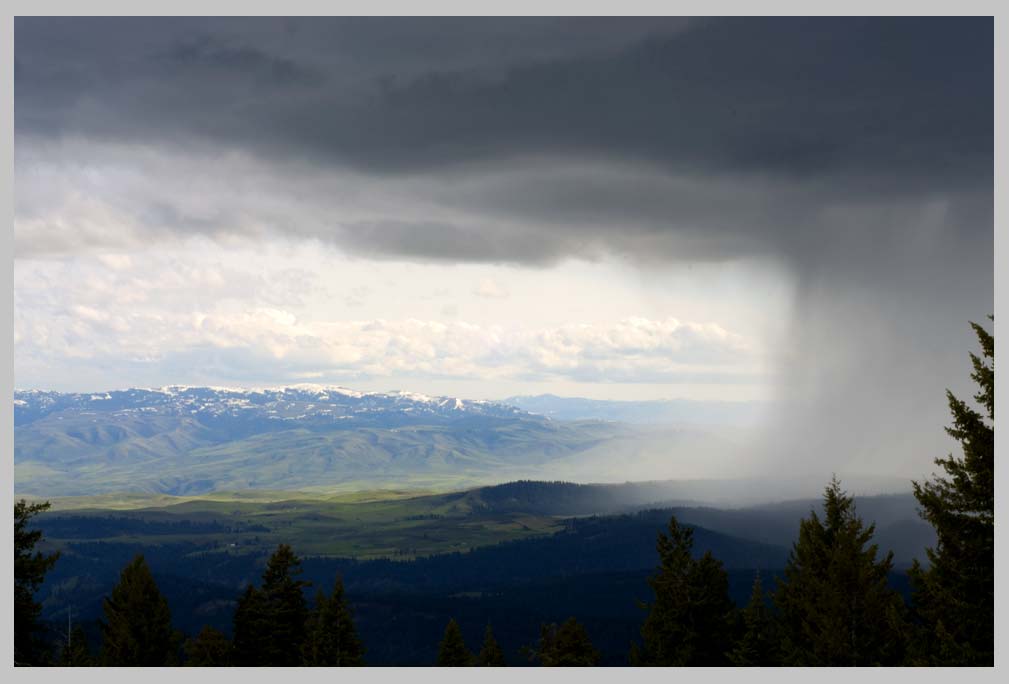

EAGLE VALLEY—turbulentia. South Wallowas, great transitional [ click photo for next . . . ]
divide between Canyon Country & High Mountain Country.
Eagle Cap Wilderness . . .


EAGLE VALLEY—turbulentia. South Wallowas, great transitional [ click photo for next . . . ]
divide between Canyon Country & High Mountain Country.
Eagle Cap Wilderness . . .
This is May in rugged and wild Northeast Oregon. But
only a part of the whole. In the image above, made
just last Thursday at about 2000 m from a basecamp
in 1.6 m of solid winter snowpack, we're looking
South over the dramatic transitional landscape from
high alpine, to the much lower and drier and open
sagebrush steppe of the Snake River.
I can think of no European equivalent, in both sharpness
of contrast and vastness of scale (other than perhaps the
south or Spanish side of the central Pyrenees). The two
photographs below, one, a quick improvised snow bivi, where
the above was made, and the second, just a short 300 meter
ski north up into one of the most spectacular Whitebark Pine
/ Clark's Nutcracker communities still left in the
Pacific Northwest, help complete the picture.
Remember. All I did is turn around with my camera,
and face the other way:
View Northeast, out of High Wallowas,
into the drier Canyon Counry . . .
If music is, like Rainer Maria Rilke jotted down in an occasional
poems in a concert guestbook in the south of Germany, around 1918,
'audible landscape,' then...
Well, wait.
Let me give you the entire poem in English here, for it is a
masterpiece of metaphor and image:
TO MUSIC
Music. The breathing of statues. Perhaps:
The silence of pictures.You, language where all
languages end. You, time
standing straight up out of the direction
of hearts passing on.Feeling, for whom? O the transformation
of feeling into what?— into audible landscape.
Music: you stranger. Passion which
has outgrown us. Our inner most being,
transcending, driven out of us,—
holiest of departures:
inner worlds now
the most practiced of distances, as
the other side of thin air:
pure,
immense
no longer habitable.
(tr. Cliff Crego)
Audible landscape. Now there's a theme one could ponder for
many lifetimes. In the present era—what I see as the Dark Ages
of the Literal Man, or, as I've written elsewhere, the mistaken
Trinity Path of the way of hydrocarbons and control by force—
Music has in my view faired no better than the Land itself.
(see the essay below...)But don't take my word for it. Come sit here for yourself
a while. And let the silence speak to you.
Follow @cliffcrego
On the road in the American Northwest.
ON THE COLLAPSE OF CONTEMPORARY
MUSICAL CULTURE (I) [an essay outline, from
my whitebark blog . . .]
“When words become unclear, I shall
focus with photographs. When images
become inadequate, I shall be
content with silence.”
Ansel AdamsMusic is not separate from Nature.
Music is not separate from metaphysics.How we think about Nature, and think about
about thinking itself, conscious or not, in a
tacit yet powerful way, shapes our perception
of music and musical meaning.The current habit of both Western popular
and intellectual culture is not to give attention
to these things. In music, this means that things—
assumptions, traditions, habits, practices—by
and large go unquestioned. This unquestioning
attitude is really a kind of denial. And denial, in turn,
is a kind of fragmentation or a separation from the
urgencies of reality which makes short-term existence
a bit easier to handle, but has from a broader
perspective potentially devastating and disastrous
consequences.Collapse in the most fundamental sense is
caused by contradiction. Contradiction is literally
when two movements ’speak’ or fight against
one another. Contradictions are not a part of
natural movement simply because they are a
tremendous waste of energy.Contemporary musical culture—classical musical
culture—is now rife with contradictions. Almost
none of these are being addressed.The key feature of these contradictions in musical
culture is fragmentation. Keep one image in mind:
the form of a fine violin, weighing almost nothing,
yet capable of projecting its vibrant, living sound
and filling amazingly large spaces. If we smash the
violin, however, it is nothing. Just a pile of
useless shards.That is fragmentation.
This is what at a much larger and more profound
and subtle level has happened to musical culture
as a whole. It has been smashed. What we have
now is shards, all struggling to exist in isolation,
but not adding up to anything sustainable
on the long term.Yet we continue, unquestioningly, as if everything
where still whole, yet repeating over and over again
the same mistakes. By now, like a piece played
with wrong notes and out of tune that nobody
hears any more, mistakes have become the norm.
They get contracts. Applause. They win prizes.
So now, the AT (Alexander Technique) adage
demonstrates its truth: If you’re wrong, what is
right is bound to seem wrong to you.My contention is that there is not a single
contradiction in musical culture that is specific
to music. That is why it is necessary to pause
and step back to view carefully and with a certain
sustained seriousness musical culture from the
broadest possible vantage point. [part I]
THE LITTLE CLAVIER please preview 150 of 631 pages
w/ my black & white photography [opens in new window]
